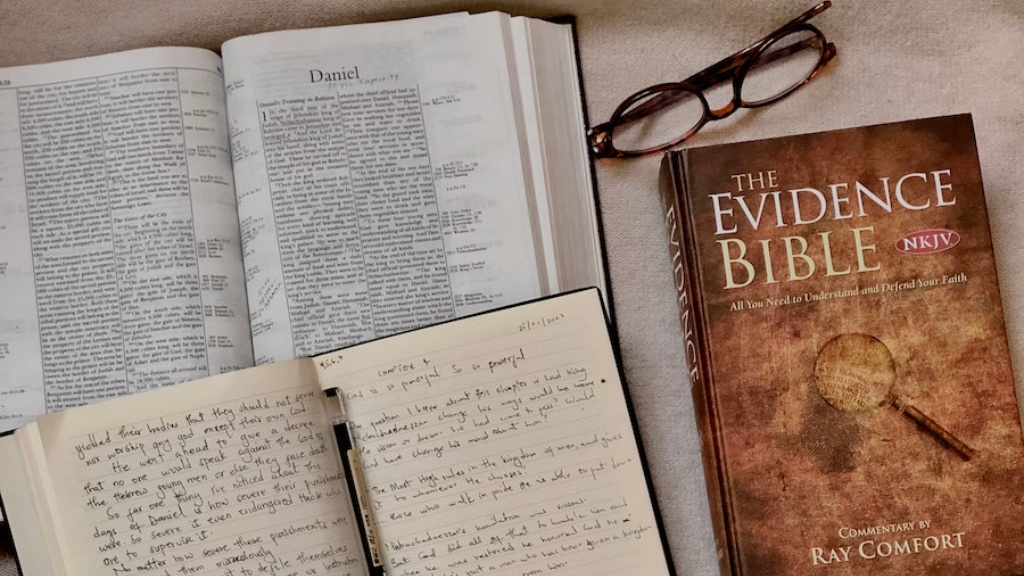The Book of Enoch is one of the most debated books within Christian and biblical scholarship. Theories about when it was removed from the Bible abound, and there are widely accepted views on the subject. To understand the issue, it would help to have an understanding of what the Book of Enoch is and why it was removed from the Bible.
The Book of Enoch is an ancient Jewish work, written by the patriarch Enoch. It is comprised of five distinct books, or “sections”, with the first being a first-person narrative purported by Enoch himself. The remainder of the books focus on angels and demons and their role in human history, including presenting a vivid description of the Watcher Angels and the subsequent righteous judgement upon them. It is sometimes referred to as 1 Enoch, as it was traditionally the first of the books to be written.
The Book of Enoch has been excluded from the officially recognized Bible for centuries, although it was highly respected by many early Christians. Scholars continue to debate the reasons for its removal and there continues to be disagreement about when it was removed. Some say that the Book of Enoch was rejected by the Greek Church in the 4th century CE, while others believe it was already removed from the Christian Bible by the 3rd century CE.
There is also debate as to why the Book of Enoch was removed. There have been a variety of explanations given, ranging from its perceived unorthodox nature to its perceived similarity to Apocalypse of Peter. In the end, it appears that the Book of Enoch was removed due to its incompatibility with the evolving orthodox doctrines of the Church. As such, the Book of Enoch was excluded from the Bible as a result of its contrasting teachings about sin and redemption in comparison to traditional teachings.
Today, the Book of Enoch has a substantial presence in various forms of Christianity, from being accepted into the Ethiopian Orthodox Church’s canon to being the basis of the Dead Sea Scrolls. In the absence of consensus on the matter, it is difficult to pinpoint exactly when the Book of Enoch was removed from the Bible, though the prevailing view appears to be that it was either before or around the 4th century CE.
When Was the Book of Enoch Rediscovered?
The Book of Enoch was first rediscovered in 1773 by James Bruce, a British explorer and adventurer. He discovered three copies of the book in Ethiopia and brought them back to England, where they were translated into English. Since then, the text has been translated into various languages and has gained renewed interest thanks to the recent discovery of the Dead Sea Scrolls.
The Dead Sea Scrolls, discovered in the 1940s in a cave in Israel, contained fragments of the Book of Enoch which date back to at least the 2nd century BCE. This provided an important clue to the antiquity of the book and helped scholars confirm the authenticity of the modern translations of the book.
Since its rediscovery, the Book of Enoch has become more widely accepted among religious scholars and theologians, many of whom view the text as an important part of the Judeo-Christian tradition.
The Book of Enoch is still revered by some Christian groups, particularly among those who believe in a pre-rapture scenario. These believers view the revelations contained in the book as crucial to understanding the events preceding the second coming of Jesus.
The Significance Of The Book Of Enoch
Despite being removed from the Bible, the Book of Enoch still holds significance in many circles. It is widely seen as an important source of knowledge about angelology and demonology and has come to be regarded as an indispensable source for our understanding of early Jewish eschatology.
The Book of Enoch has also been an important source of inspiration for many works of art, literature, and film. Authors such as Gustav Meyrink, J.R.R. Tolkien, and C.S. Lewis have all drawn inspiration from the book, while films such as “Legion” and the “Matrix” trilogy have incorporated elements of the book into their plots.
Despite its removal from the Bible, the Book of Enoch continues to be an important part of our understanding of the Judeo-Christian traditions. Its teachings about angels and demons continue to fascinate and inspire, and its mysterious lore continues to attract scholarly attention from around the world.
Modern Popularity of the Book of Enoch
The Book of Enoch has seen a resurgence of popularity in modern times, due in part to its inclusion in the Dead Sea Scrolls. It has since become a popular source of discussion among scholars and Christian theologians, who continue to debate its validity and relevance to Christianity.
The book has become a subject of research for scholars across numerous disciplines and its influence can be seen in numerous works of literature and film. Its popularity among religious and scholarly circles has also led to its inclusion in some modern translations of the Bible.
Furthermore, the Book of Enoch has become a source of fascination for the general public, and has been the subject of numerous conspiracy theories. It has also become popular among certain occult and New Age groups, who have found much to gain from its teachings.
The Future of the Book of Enoch
There is still much disagreement surrounding the origins and authenticity of the Book of Enoch, but it appears likely that the text will continue to occupy an important place in Judeo-Christian studies in the future. Its teachings about angels and demons continue to capture the imagination of scholars, theologians, and ordinary people alike and its popularity shows no signs of abating.
The future of the Book of Enoch is still uncertain, but it is clear that its place in Judeo-Christian tradition is assured. For centuries, the book has captivated people’s imaginations and its enigmatic nature is sure to ensure that it remains an interesting subject of discussion for years to come.
The Impact of the Book of Enoch on Modern Christianity
The Book of Enoch continues to have an important influence on the development of modern Christianity. Many of its teachings, particularly the idea of pre-Rapture, have become part of the accepted beliefs of some Christian denominations, while its insights on angelology have also proved popular with many modern believers.
Furthermore, the Book of Enoch has become a source of inspiration for many theologians, artists and authors. Its teachings about sin and redemption continue to shape our understanding of early Christian teachings, and its references to the Watcher Angels provide an interesting insight into the darker corners of religious history.
The Book of Enoch has been an important source of debate and discussion for centuries, and its teachings continue to be felt in modern Christianity. Despite its exclusion from the Bible, the book appears to remain an important source of inspiration and knowledge for many theologians and religious believers.
The Legacy of the Book of Enoch
The legacy of the Book of Enoch is intertwined with its exclusion from the Bible. The mysterious and heretical nature of the book has added to its allure, and it continues to fascinate and capture the imagination of many people.
It is unclear what the long-term legacy of the book will be, but given its mysterious nature and continued relevance to modern theology, it appears that its influence will remain strong for many years to come. The Book of Enoch continues to be an important source of debate and discussion, and its teachings and insights remain as relevant today as when it was first written.
The Debate Over the Book of Enoch
The debate over the validity of the Book of Enoch has raged for centuries, and shows no sign of coming to an end. The text is often seen as a source of heretical and unorthodox teachings, though it is also revered by some groups, particularly those who believe in a pre-Rapture scenario.
The Book of Enoch continues to be the subject of much discussion among theologians and religious scholars, and its influence on early Christianity cannot be overstated. It remains a source of fascination for many and its teachings and insights continue to have relevance today.
Conclusion
The question of when the Book of Enoch was removed from the Bible is complex and still a matter of debate. Much has been speculated about its removal, from it being incompatible with evolving orthodox doctrines of the Church, to its similarity to Apocalypse of Peter. Despite this, its legacy remains strong and it is still revered by many Christians as an important source of knowledge about angelology and demonology.






I was wanting to know when it was removed from the Bible.